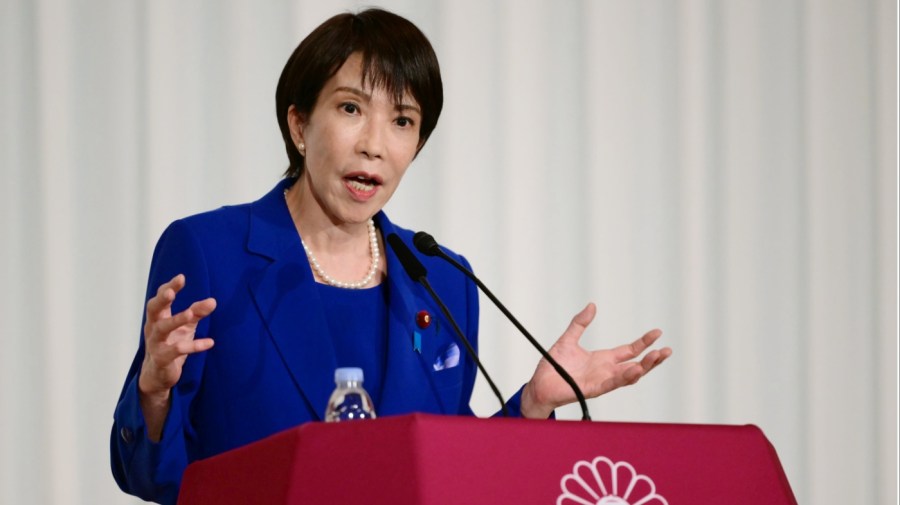World
Sanae Takaichi Elected as Japan’s First Female Prime Minister

Sanae Takaichi made history on October 3, 2023, by becoming Japan’s first female prime minister. The leader of the Liberal Democratic Party (LDP) secured her position after receiving 212 votes out of a total of 404 in the National Diet, surpassing the required majority by four votes. Her election marks a significant milestone in Japan’s political landscape, which has long been dominated by male leaders.
Takaichi’s political journey has spanned various roles within Japan’s government, including ministerial positions that have equipped her with extensive experience. She previously served as Minister of Internal Affairs and Communications and held other key roles that shaped her understanding of Japan’s political and social issues. Her long-standing involvement in politics includes over a decade as a member of the National Diet, representing the Hiroshima constituency.
In her acceptance speech, Takaichi emphasized her commitment to addressing pressing issues facing Japan, such as economic recovery, demographic challenges, and national security. She expressed her aim to create a society where everyone can thrive, underscoring the importance of inclusivity and economic opportunity.
Prime Minister Takaichi faces several challenges ahead, particularly in revitalizing Japan’s economy, which has struggled with stagnation and inflation concerns. Her leadership will also be tested as she navigates Japan’s foreign relations, notably with neighboring countries and global superpowers.
The LDP, which has been in power for most of the post-war period, is well-positioned to support Takaichi’s agenda, but she will still need to rally support across the political spectrum. The dynamics within the National Diet will play a crucial role in her ability to implement policy changes.
Takaichi’s election is celebrated by many as a progressive step for gender representation in Japanese politics. While Japan has seen improvement in women’s participation in various sectors, political leadership has remained predominantly male. Her ascension to the highest office in the country could inspire a new generation of female leaders and change perceptions about women’s roles in governance.
As Japan enters this new chapter under Takaichi’s leadership, the world will be watching closely to see how her administration addresses both domestic and international challenges. Her capability to lead effectively will not only shape her legacy but also influence Japan’s position on the global stage.
The implications of Takaichi’s leadership extend beyond politics; they resonate with societal expectations and the ongoing discourse surrounding gender equality in Japan. As the nation looks forward, her tenure may very well redefine the landscape of Japanese politics and inspire future advancements in women’s roles in leadership.
-

 Science2 weeks ago
Science2 weeks agoIROS 2025 to Showcase Cutting-Edge Robotics Innovations in China
-

 Politics2 weeks ago
Politics2 weeks agoJudge Considers Dismissal of Chelsea Housing Case Citing AI Flaws
-

 World2 weeks ago
World2 weeks agoBravo Company Veterans Honored with Bronze Medals After 56 Years
-

 Top Stories2 weeks ago
Top Stories2 weeks agoIndonesia Suspends 27,000 Bank Accounts in Online Gambling Crackdown
-

 Lifestyle2 weeks ago
Lifestyle2 weeks agoStone Island’s Logo Worn by Extremists Sparks Brand Dilemma
-

 Health2 weeks ago
Health2 weeks agoStartup Liberate Bio Secures $31 Million for Next-Gen Therapies
-

 Sports2 weeks ago
Sports2 weeks agoMel Kiper Jr. Reveals Top 25 Prospects for 2026 NFL Draft
-

 Health2 weeks ago
Health2 weeks agoTop Hyaluronic Acid Serums for Radiant Skin in 2025
-

 World2 weeks ago
World2 weeks agoHoneywell Predicts Record Demand for Business Jets Over Next Decade
-

 Politics2 weeks ago
Politics2 weeks agoNew Jersey Voters Urged to Register Ahead of November Election
-

 Lifestyle2 weeks ago
Lifestyle2 weeks agoMary Morgan Jackson Crowned Little Miss National Peanut Festival 2025
-

 Sports2 weeks ago
Sports2 weeks agoYamamoto’s Mastery Leads Dodgers to 5-1 Victory in NLCS Game 2









